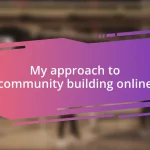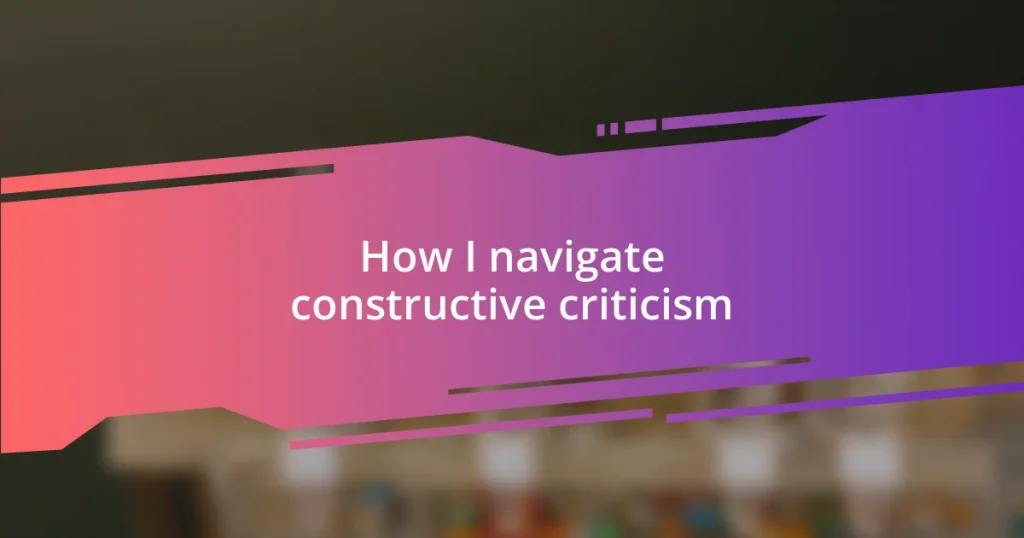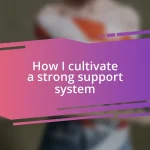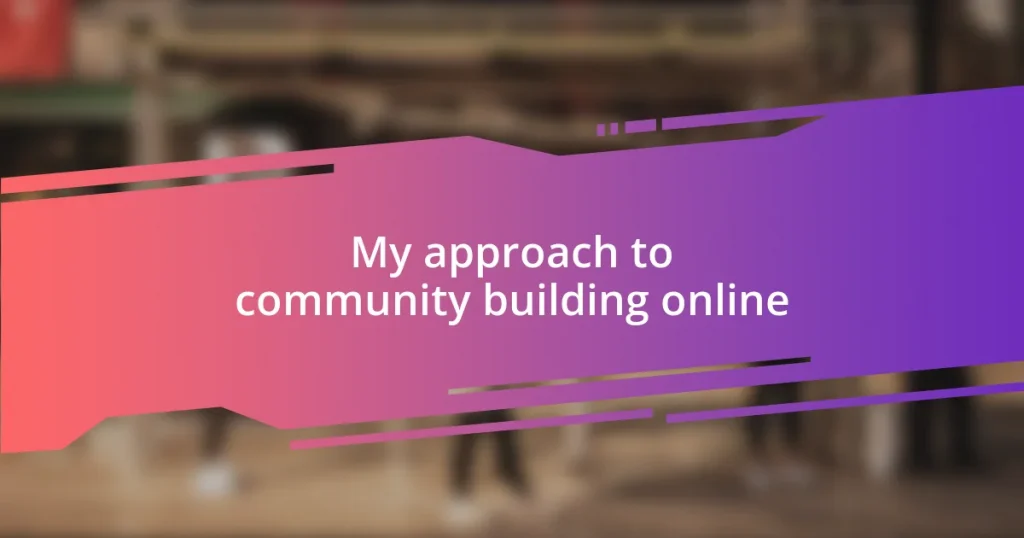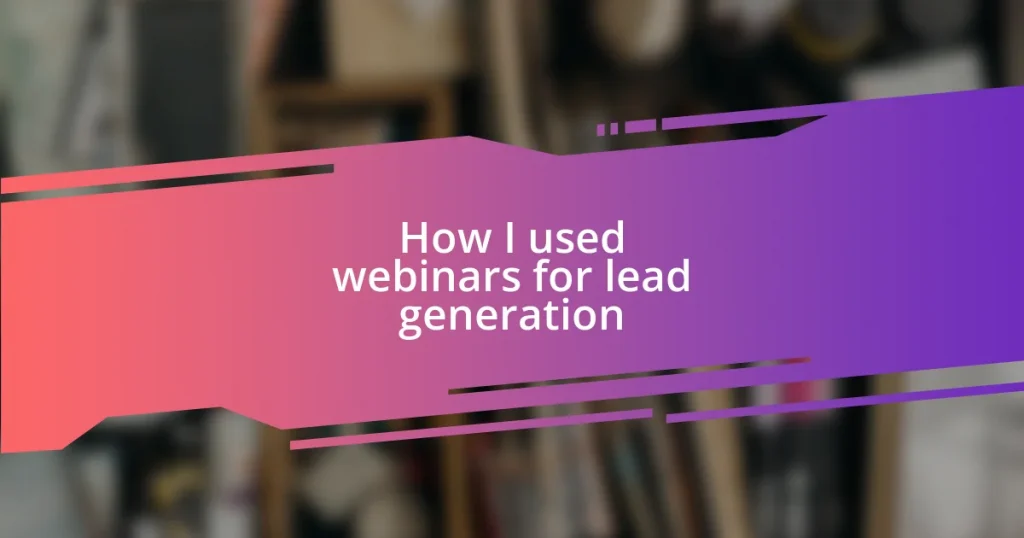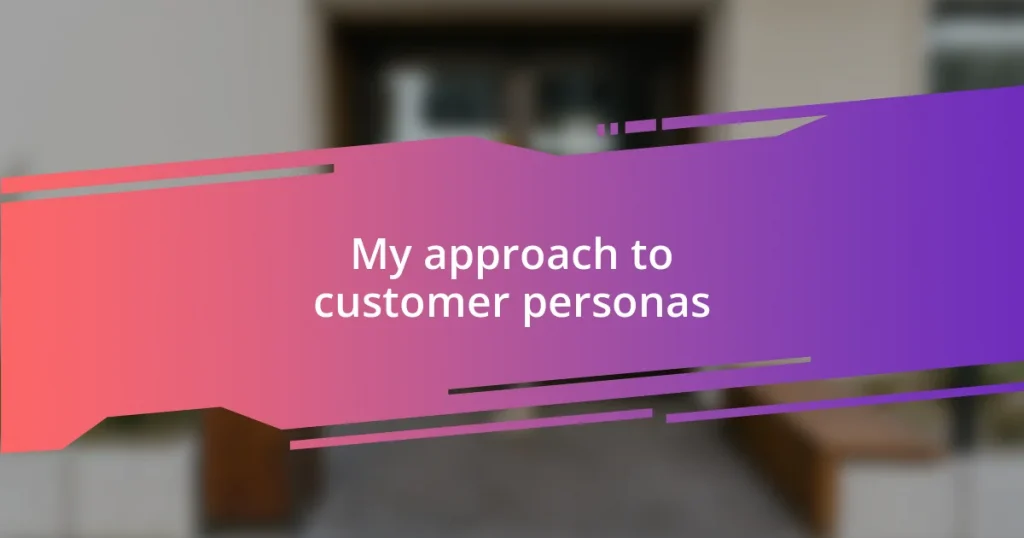Key takeaways:
- Constructive criticism is an opportunity for growth, emphasizing the importance of differentiating it from negativity; focusing on intentions leads to meaningful improvements.
- Implementing feedback can foster stronger relationships and enhance skills, with reflection transforming critiques into actionable goals and boosting self-awareness.
- Building resilience to criticism involves shifting mindset, practicing self-compassion, and engaging in supportive communities that encourage open discussions about feedback.
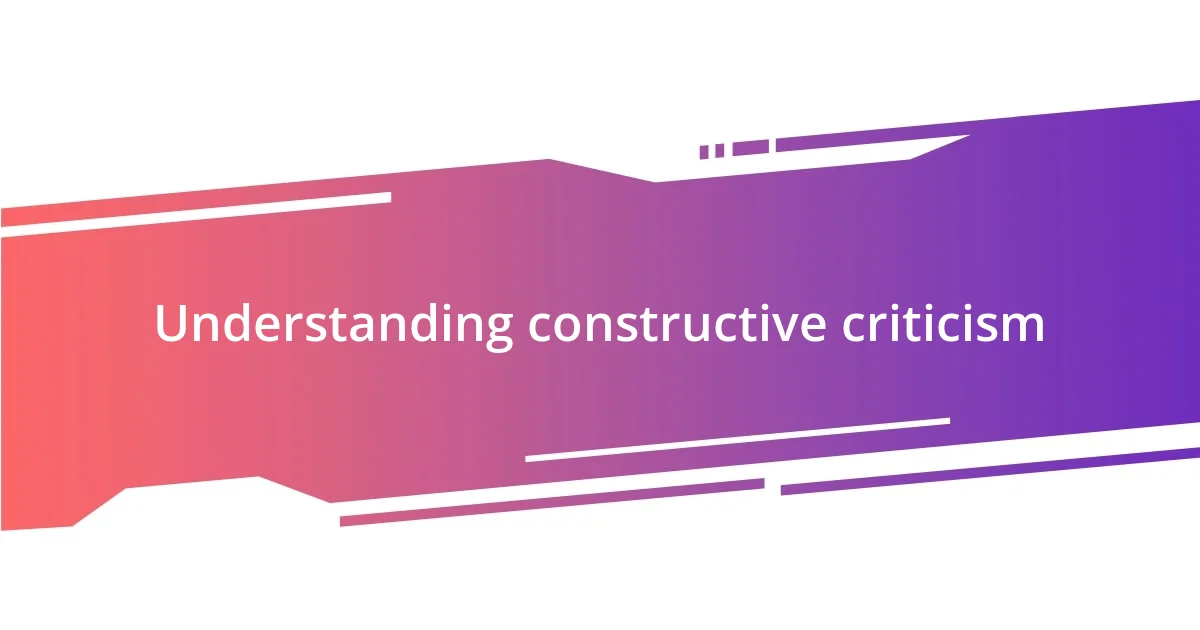
Understanding constructive criticism
Understanding constructive criticism is crucial for personal and professional growth. It’s not just about pointing out flaws; it’s an opportunity to enhance our skills. I remember the first time I received feedback on a project I worked tirelessly on. Initially, I felt a wave of defensiveness wash over me, but I soon realized that the comments were meant to highlight areas where I could improve rather than attack my abilities.
When someone offers constructive criticism, it often comes from a place of care, intending to help us succeed. Think about it—have you ever given feedback to a friend because you wanted to see them thrive? That’s the essence of constructive criticism. I once had a mentor who sat me down and offered advice on my presentation style. At first, I was nervous, but he framed his feedback in such a supportive way that I felt empowered to make those changes.
It’s important to differentiate between constructive criticism and mere negativity. While the former aims to provide guidance, the latter often serves no purpose other than to belittle. Reflecting on my experiences, I’ve learned to look past the discomfort and focus on the message instead. Have you found yourself in a situation where you felt criticized without benefit? Recognizing the intention behind the words can transform our response and ultimately lead to meaningful growth.
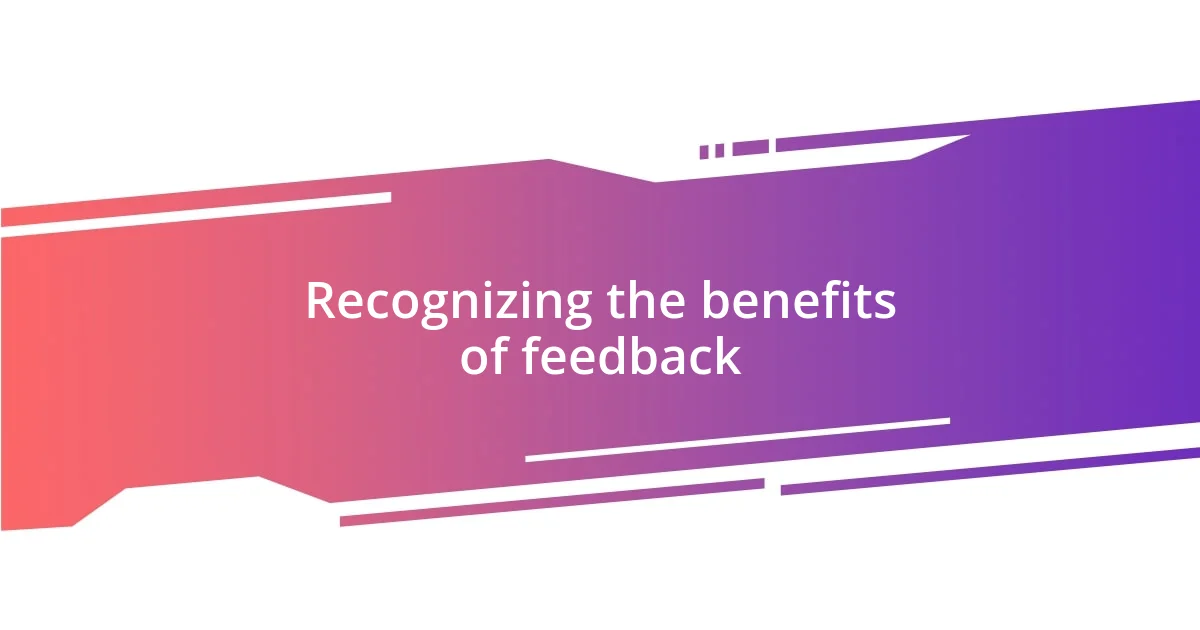
Recognizing the benefits of feedback
Recognizing the benefits of feedback is about understanding how it can elevate our performance and broaden our perspective. When I received feedback on my first writing piece, I remember feeling vulnerable yet excited. It opened my eyes to skills I hadn’t considered honing. I embraced the chance to refine my voice, ultimately making my work stronger and more engaging. This realization made me appreciate feedback as a vital part of my growth.
Feedback can also foster deeper connections with colleagues and mentors. It’s interesting how a simple exchange of constructive thoughts can lead to stronger professional relationships. I once collaborated on a project where we regularly exchanged suggestions. The camaraderie that developed from those conversations not only improved our work but also created a supportive environment where everyone felt valued. It was heartening to witness the transformation of our teamwork through shared insights.
Moreover, feedback is a mirror reflecting our blind spots. I’ve often found myself so entrenched in my work that I miss critical areas for improvement. A colleague pointed out a recurring mistake I never seem to catch, which was humbling yet vital for my development. Acknowledging those blind spots equips us with the knowledge we need to succeed. After all, isn’t self-awareness a cornerstone of personal and career growth?
| Type of Feedback | Benefit |
|---|---|
| Constructive Criticism | Enhances skills and performance |
| Peer Feedback | Builds stronger relationships |
| Self-Reflection | Increases self-awareness |
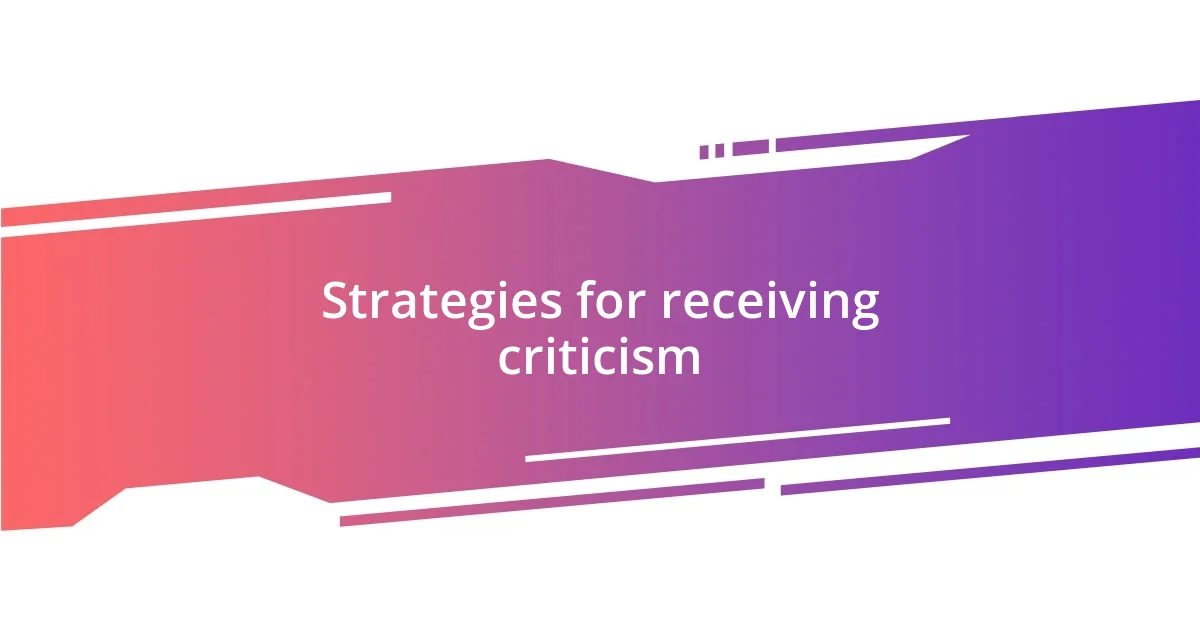
Strategies for receiving criticism
Receiving criticism can feel daunting, but with a few strategies in mind, it becomes a more manageable experience. Personally, I’ve found that taking a moment to breathe before responding helps dissolve that initial defensiveness. I often remind myself that the feedback isn’t a personal attack but rather an opportunity for growth. This mindset shift can be transformative.
To effectively receive criticism, consider these strategies:
- Listen Actively: Give the feedback your full attention without interrupting. I’ve learned that sometimes, just listening can uncover insights I hadn’t noticed before.
- Ask Questions: Clarifying any uncertainties can deepen your understanding. When a colleague pointed out an area for improvement in my workflow, I asked specific questions that not only clarified their points but also revealed additional facets I hadn’t considered.
- Take Notes: Jotting down key points during the feedback session creates a tangible reference for later. It’s been beneficial for me to refer back to them and track my progress.
- Look for Actionable Items: Identify clear steps for improvement. I remember a time when feedback made me realize I needed to improve my public speaking skills. I created a plan to take a course and practice regularly—resulting in noticeable progress.
- Thank the Critic: Expressing gratitude, even when it stings, fosters goodwill and opens the door for future dialogue. I often remind myself that those offering feedback are contributing to my development, and their insights deserve acknowledgment.
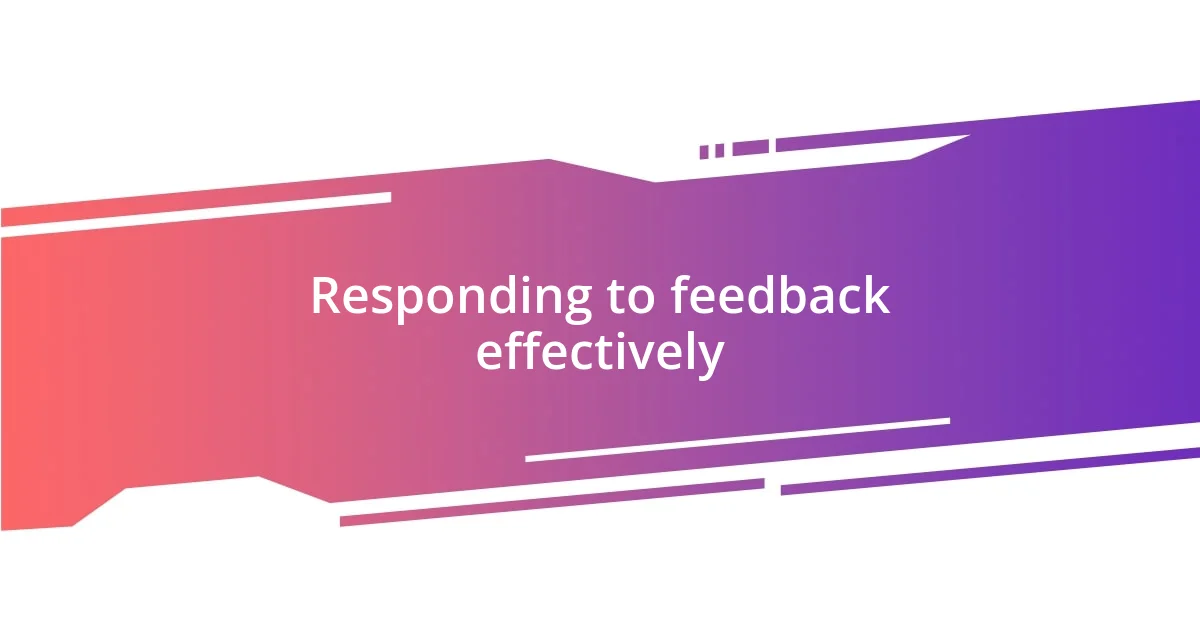
Responding to feedback effectively
Engaging with feedback effectively is crucial for growth. One strategy I’ve found particularly helpful is to respond with a genuine “thank you” right away. This simple acknowledgment not only diffuses any tension for me but also reinforces a positive relationship with those offering insights. I’ve noticed that showing appreciation can lead to more honest discussions and, surprisingly, it makes me feel less vulnerable.
Another approach I embrace is reflecting on the feedback later. After receiving suggestions on a recent project, I took time to mull over the comments during a walk. It allowed me to process everything without that immediate rush of emotions. I often think, “What did this really reveal about my work?” In this quiet moment, I grasped nuances I initially overlooked, ultimately transforming that feedback into a pathway to improvement.
Lastly, I’ve learned that it’s perfectly okay to give myself time to digest feedback before acting. Recently, I received pointed constructive criticism that stung a bit. Instead of jumping into action, I took a day to think about it. This reflection made me realize that not every piece of feedback requires instant change; sometimes, it’s best to let it simmer for a while before diving in. Does anyone else feel that way? I find this thoughtful approach leads to more meaningful adjustments down the line.
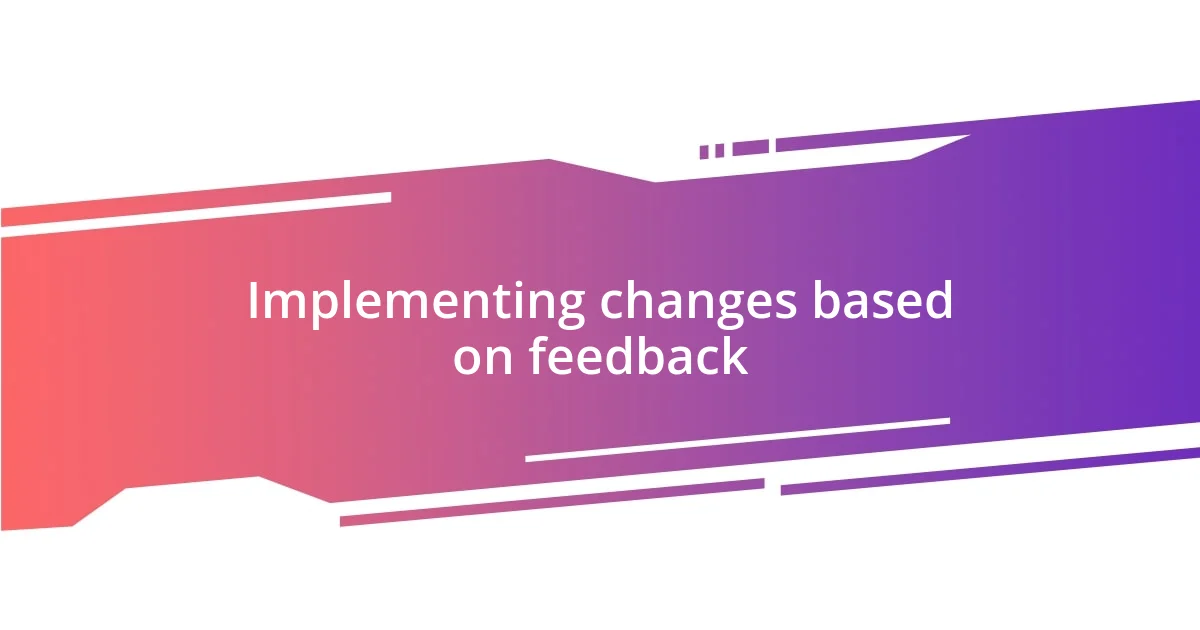
Implementing changes based on feedback
I know firsthand that implementing changes based on feedback can be a bit overwhelming. One time, a mentor pointed out that my reports were lacking in clarity. I felt a mix of frustration and motivation. Instead of sulking, I decided to break down my writing process. I created a checklist to ensure each report addressed key points clearly. That simple adjustment not only improved my reports significantly but also boosted my confidence.
There’s a certain thrill in experimenting with feedback. When I tackled suggestions to enhance my teamwork skills, I set out to initiate more conversations with my colleagues during projects. I vividly remember the first time I engaged in an open brainstorming session. The energy in the room shifted, and suddenly, we were all bouncing ideas off one another. It made me realize that the changes I implemented brought about a more collaborative spirit within the team, ultimately leading to better outcomes. Isn’t it fascinating how a simple shift in approach can foster a more dynamic workplace?
As I continue to integrate feedback, I like to celebrate the little wins along the way. Recently, I received comments that my presentation style had improved. I took a moment to reflect on that progress and shared my journey with my peers. Acknowledging how far I’ve come—not just in relation to feedback but in my overall growth—has made it easier to embrace future criticism. It’s like building resilience; the more you adapt, the more equipped you become for the next wave of insights. How do you celebrate your growth? I’d love to hear how others create a habit out of adapting to feedback.
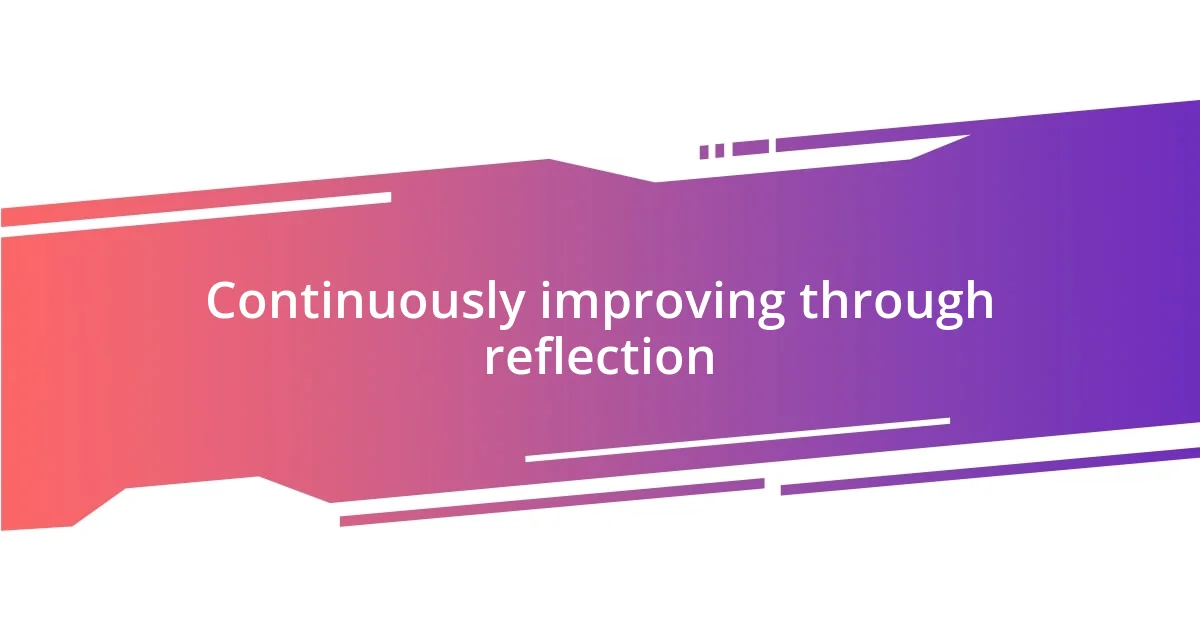
Continuously improving through reflection
Engaging in reflection after receiving feedback has been a game changer for me. For instance, after a challenging talk with my supervisor about my presentation skills, I felt a mix of vulnerability and motivation. I took a few moments in my favorite coffee shop, savoring a warm cup while jotting down my thoughts. This peaceful environment allowed me to sift through the criticisms and extract valuable lessons, revealing angles I hadn’t considered before. Have you ever found clarity in quiet moments like that?
I often find that reflection helps to transform raw feedback into actionable goals. When a colleague pointed out that my project management skills needed refinement, I initially felt overwhelmed. Yet, instead of letting it sit in my mind like an unwanted guest, I spent the weekend brainstorming practical steps. I wrote down specific areas to focus on and even created a mini-action plan. This process turned a daunting task into an exciting challenge, and I could feel my excitement building as I envisioned the improvements. Doesn’t it feel rewarding to actively shape your growth instead of letting criticism linger in the air?
Sometimes, I approach reflection as a therapeutic exercise, giving myself permission to feel while processing feedback. I remember a time when I faced criticism that felt particularly harsh—almost like being under a spotlight. Instead of dismissing my emotions, I allowed myself to feel the sting, writing down my feelings as they came. This cathartic experience helped me move beyond defensiveness, enabling me to see the feedback in a broader context. It was an eye-opening moment for me, affirming that reflection isn’t just about analysis; it’s also about understanding ourselves better through the lens of others’ perceptions. Have you ever explored your emotions to find unexpected insights?
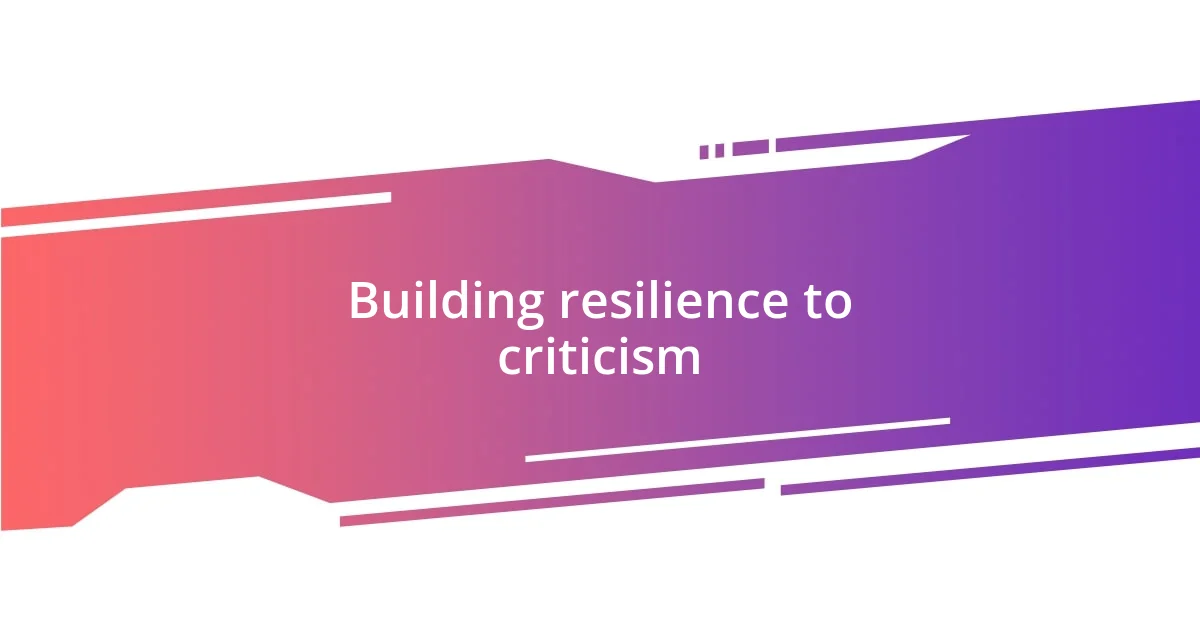
Building resilience to criticism
Building resilience to criticism is a journey, and I’ve learned that it’s essential to shift my mindset when facing perceived failures. There was a time when a colleague gave me feedback that felt more like a personal attack than constructive input. Initially, I wanted to respond defensively, but instead, I took a deep breath and asked myself, “What can I learn from this?” That question opened the door to growth, allowing me to approach feedback with curiosity rather than fear.
I’ve also found it incredibly helpful to surround myself with positive influences who encourage resilience. One memorable experience was when I joined a group that meets monthly to share and discuss feedback openly. In these sessions, not only do we support one another, but we also dissect challenges together. Listening to others’ stories of overcoming criticism made me realize that I’m not alone in this struggle. It was uplifting to discover that vulnerability can actually strengthen connections and provide a shared sense of purpose. Have you ever participated in a supportive group that helped you process feedback?
Another aspect that has truly helped me is practicing self-compassion. When I faced criticism that felt overwhelming, I was quick to judge myself harshly. But, I learned to pause and remind myself that making mistakes is part of being human. For instance, I recall a time when I miscommunicated a project detail, and the fallout felt immense. Yet, instead of spiraling into self-doubt, I acknowledged the error and focused on what I could take away from the experience. I started to treat myself with the same kindness I would offer a friend. This shift became a vital piece of building resilience; after all, how can we bounce back if we’re constantly beating ourselves down?
